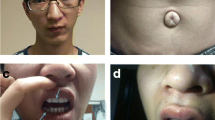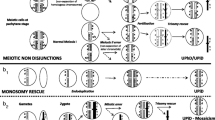Abstract
We investigated the parent and cell division of origin of the extra chromosome 18 in 62 aneuploids with a free trisomy 18 by using chromosome-18-specific pericentromeric short-sequence repeats. In 46 cases, DNA of patients was recovered from archival specimens, such as paraffin-embedded tissues and fixed chromosomal spreads. In 56 families, the supernumerary chromosome was maternal in origin; in six families, it was paternal. Among the 56 maternally derived aneuploids, we could exclude a postzygotic mitotic error in 52 cases. Among those in which the nondisjunction was attributable to an error at meiosis, 11 were the result of a meiosis I nondisjunction and 17 were caused by a meiosis II error. This result differs markedly from findings in acrocentric chromosomes where nondisjunction at maternal meiosis I predominates. Among the six paternally derived cases, two originated from a meiotic error, indicating that a nondisjunction in paternal meiosis is not as rare as previously suggested.
Similar content being viewed by others
References
Antonarakis SE and the Down syndrome collaborative group (1991) Parental origin of the extra chromosome in trisomy 21 as indicated by analysis of DNA polymorphisms. N Engl J Med 324:872–876
Antonarakis SE, Petersen MB, McInnis MG, Adelsberger PA, Schinzel AA, Binkert F, Pangalos C, Raoul O, Slaugenhaupt SA, Hafez M, Cohen MM, Roulson D, Schwartz S, Mikkelsen M, Tranebjaerg L, Greenberg F, Hoar DI, Rudd NL, Warren AC, Metaxotou C, Bartsocas C, Chakravarti A (1992) The meiotic stage of nondisjunction in trisomy 21: determination by using DNA polymorphisms. Am J Hum Genet 50:544–550
Antonarakis SE, Avramopoulos D, Blouin J-L, Talbot CC Jr, Schinzel AA (1993) Mitotic errors in somatic cells cause trisomy 21 in about 4.5% of cases and are not associated with advanced maternal age. Nature Genet 3:146–150
Babu A, Verma RS (1986) The heteromorphic marker on chromosome 18 using restriction endonucleaseAluI. Am J Hum Genet 38:549–554
Bugge M, Petersen M, Hertz J, Mikkelsen M (1994) DNA studies in trisomy 18. Cytogenet Cell Genet 65:141–165
Eggermann T, Nöthen MM, Propping P, Schwanitz G (1993) Molecular diagnosis of trisomy 18 using DNA recovered from paraffin embedded tissues and possible implications for genetic counselling. Ann Génét (Paris) 36:214–216
Fisher JM, Harvey JF, Morton NE, Jacobs PA (1995) Trisomy 18: studies of parent and cell division of origin and the effect of aberrant recombination on nondisjunction. Am J Hum Genet 56:669–675
Guay-Woodford LM, Muecher G, Hopkins SD, Avner ED, Germino GG, Guillot AP, Herrin J, Hollemann R, Irons DA, Primack W, Thomson PD, Waldo FB, Lunt PW, Zerres K (1995) The severe perinatal form of autosomal recessive polycystic kidney disease (ARPKD) maps to chromosome 6p21.1-p12: implications for genetic counseling. Am J Hum Genet 56:1101–1107
Gyapay G, Morissette J, Vignal A, Dib C, Fizames C, Millasseau P, Marc S, Bernardi G, Lathrop M, Weissenbach J (1994) The 1993-94 Généthon human genetic linkage map. Nature Genet 7:246–339
Hassold T, Chin D (1985) Maternal age-specific rates of numerical chromosomal abnormalities with special reference to trisomy. Hum Genet 70:11–17
Hassold T, Jacobs PA (1984) Trisomy in man. Annu Rev Genet 18:69–97
Hassold T, Jacobs PA, Leppert M, Sheldon M (1987) Cytogenetic and molecular studies of trisomy 13. J Med Genet 24:725–732
Hassold TJ, Pettay D, Freeman SB, Grantham M, Takaesu N (1991) Molecular studies of non-disjunction in trisomy 16. J Med Genet 28:159–162
Jonveaux P (1991) PCR amplification of specific DNA sequences from routinely fixed chromosomal spreads. Nucleic Acids Res 19:1946
Kessel AG van, Straub RE, Silverman GA, Gerken S, Overhauser J (1994) Report of the second international workshop on human chromosome 18 mapping. Cytogenet Cell Genet 65:142–163
Kondoh T, Tonoki H, Matsumoto T, Tsukahara M, Niikawa N (1988) Origin of the extra chromosome in trisomy 18. Hum Genet 79:377–378
Kupke KG, Müller U (1989) Parental origin of the extra chromosome in trisomy 18. Am J Hum Genet 45:599–605
MacDonald M, Hassold T, Harvey J, Wang LH, Morton NE, Jacobs P (1994) The origin of 47,XXY and 47,XXX aneuploidy: heterogenous mechanisms and role of aberrant recombination. Hum Mol Genet 3:1365–1371
Miller SA, Dykes DD, Polesky HF (1988) A simple salting out procedure for extracting DNA from human nucleated cells. Nucleic Acids Res 16:1215
Nöthen MM, Eggermann T, Erdmann J, Eiben B, Hofmann D, Propping P, Schwanitz G (1993) Retrospective study on the parental origin of the extra chromosome in trisomy 18 (Edwards syndrome). Hum Genet 92:347–349
Petersen MB, Antonarakis SE, Hassold TJ, Freeman SB, Sherman SL, Avramopoulos D, Mikkelsen M (1993) Paternal nondisjunction in trisomy 21: excess of male patients. Hum Mol Genet 2:1691–1695
Sherman SL, Petersen MB, Freeman SB, Hersey J, Pettay D, Taft L, Frantzen M, Mikkelsen M, Hassold TJ (1994) Non-disjunction of chromosome 21 in maternal meiosis I: evidence for a maternal age-dependent mechanism involving reduced recombination. Hum Mol Genet 3:1529–1535
Telenius H, Pelmear AH, Tunnacliffe A, Carter NP, Behmel A, Ferguson-Smith MA, Nordenskjöld M, Pfragner R, Ponder BAJ (1992a) Cytogenetic analysis by chromosome painting using DOP-PCR amplified flow-sorted chromosomes. Genes Chromosom Cancer 4:257–263
Telenius H, Carter NP, Bebb CE, Nordenskjöld M, Ponder BAJ, Tunnacliffe A (1992b) Degenerate oligonucleotide-primed PCR: general amplification of target DNA by a single degenerate primer. Genomics 13:718–725
Ya-gang X, Robinson WP, Spiegel R, Binkert F, Ruefenacht U, Schinzel AA (1993) Parental origin of the supernumerary chromosome in trisomy 18. Clin Genet 44:57–61
Zaragoza MV, Jacobs PA, James RS, Rogan P, Sherman S, Hassold T (1994) Nondisjunction of human acrocentric chromosomes: studies of 432 trisomic fetuses and liveboms. Hum Genet 94:411–417
Author information
Authors and Affiliations
Additional information
Dedicated to Professor Dr. W. Gottschalk on the occasion of his 75th birthday
Rights and permissions
About this article
Cite this article
Eggermann, T., Nöthen, M.M., Eiben, B. et al. Trisomy of human chromosome 18: Molecular studies on parental origin and cell stage of nondisjunction. Hum Genet 97, 218–223 (1996). https://doi.org/10.1007/BF02265269
Received:
Revised:
Issue Date:
DOI: https://doi.org/10.1007/BF02265269




